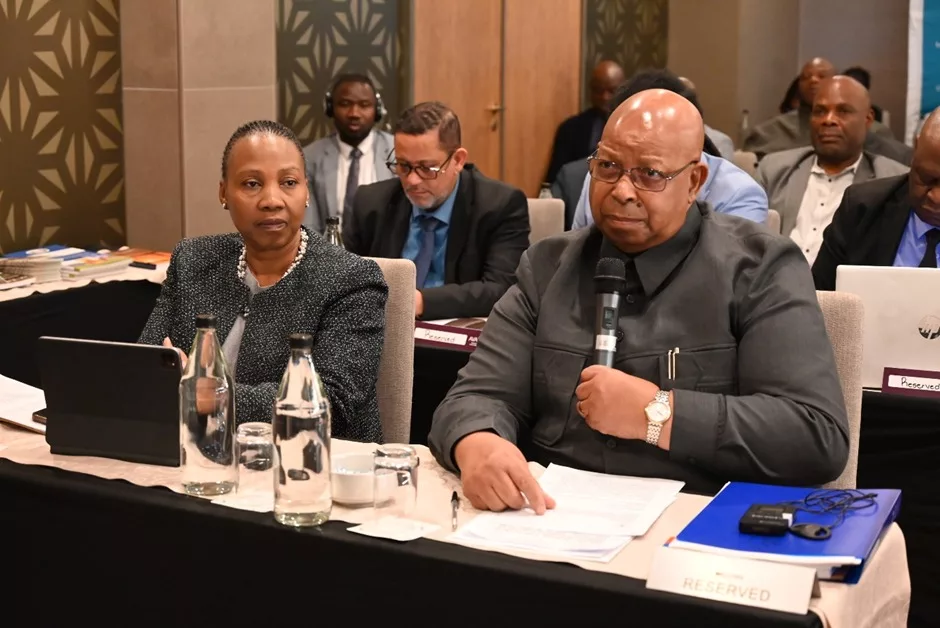|
Getting your Trinity Audio player ready...
|
The curtain was drawn on the high-level Conference “Fostering Sustainable Futures: Integrating Climate Resilience in Southern Africa,” held at the Avani Windhoek Hotel in Namibia. The final day was graced by renowned sustainable development policy experts, including Claude Kabemba, Executive Director of the Southern Africa Resource Watch (SARW), whose insights and expertise underscored the conference’s commitment to addressing climate resilience and sustainable conservation of the environment in the Southern Africa region.
Experts emphasized the necessity to integrate environmental sustainability with economic and social development. They affirmed that natural resource management must be approached holistically, considering the long-term well-being of both the planet and its inhabitants in pursuit of a wholesome natural resources governance matrix.
“To truly benefit from our natural resources, we must embrace transparency, scientific knowledge, and sustainable environmental practices. Legislators and corporations alike must prioritize the national interests by ensuring fair and equitable resource management for the present and future generations,” the experts posited. A proposal for a three-pronged approach centered on knowledge, governance, and sustainability was proffered, underlining the need to equip Governments and citizens with scientific knowledge, ensuring transparency in resource extraction and utilization thereby creating a win-win scenario for all Southern region countries and the citizenry at the community level. Accordingly, Legislators were urged to enact laws that address sustainability underpinned by the “polluter pays principle” which is legally enforceable.
On the other hand, Mr. Kabemba highlighted that Africa’s rampant consumption drives excessive natural resource extraction which fails to lead to sustainable development by causing environmental damage. Furthermore, inadequate rehabilitation environmental efforts by mining companies burdened Governments with restoring the ravaged environment. To break the conundrum, a multi-pronged approach in the extractive industries must encompass local and international local and international stakeholders, periodic Parliamentary Capacity in natural resources governance, and the transparent collaboration between Governments and local communities must be always compellingly exercised. Kabemba emphasized the need for robust legislation that prioritizes environmental protection that prioritizes environmental conservation over investor capital interests, taking a cue from countries like Portugal and Finland which have prioritized sustainable environmental needs over financial profits. He called for a long-term vision for resource extraction embedded in the national constitutions, with strategies aligned to sustainable development goals.
Kabemba further pointed out that the Democratic Republic of Congo (DRC) has the monumental potential of the Inga Dam, which can be home to a colossal hydroelectric project capable of powering the entire African Continent with the possible excess capacity to power other continents. He gave an awe-inspiring picture of an imminent unending surge of energy coursing through every city and village in Africa, all emanating from this single continental investment, the Inga dam.
In his intervention, Speaker Mudenda gave a measured approach to natural resource governance. The Speaker informed the conference Parliament of Zimbabwe’s approach to the knowledge, governance, and sustainability bases in natural resources governance as executed by the Zimbabwean Government ably led by President, Dr. E.D Mnangagwa.
He enjoined Member States to use research scholars as the knowledge pedestals in the natural resources governance matrix. Speaker Mudenda outlined the intense induction programme for Members of Parliament (MPs) of the current tenth Parliament in order to capacity-build and heighten their conceptual framework in tackling environmental legislative responsibilities. He enjoined the representatives of the people to move out of the “victim mentality” by giving examples of how Africa unyoked itself from being a market for slavery through the moral force against African slavery.
Furthermore, Africa triumphed over colonialism through sheer rugged tenacity in dislodging the imperialists through the valiant liberation struggles that ushered in independence and democracy in Africa, Speaker Mudenda opined. New perspectives, therefore, must emerge to ensure that the Global South surpasses the Global North in positive responses to the natural resources governance matrix regarding sustainable extractive industries. These transformative ideas naturally come from visionary thought leaders who possess the courage to do what is right for humanity, the Speaker asserted.
The programme ended with a visit to the Naankuse Wildlife Sanctuary, where participants received presentations on the sanctuary’s conservation initiatives in ameliorating human-wildlife conflict. This was followed by a tour of the wildlife rehabilitation facilities within the precincts of the sanctuary. The final recommendations and way forward for the conference meeting will be released in the next few days by the SADC PF Secretary General, Ms. Boemo Segkoma.






